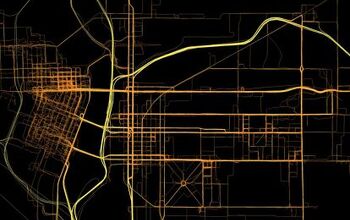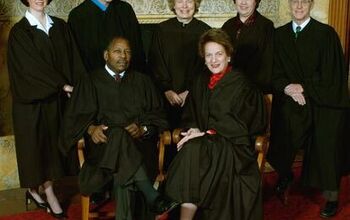Federal Court Endorses Warrantless GPS Tracking
The US Court of Appeals for the Seventh Circuit ruled yesterday in favor of police officers who attach GPS tracking devices to vehicles without first obtaining a warrant. The three-judge panel insisted searches of this sort do not violate the Fourth Amendment after considering the case of Juan Cuevas-Perez.
On February 6, 2009, Phoenix, Arizona detective Matthew Shay attached a tracking device to Cuevas-Perez’s Jeep Laredo while it was parked on the street. He did not bother to ask a judge for a warrant. By February 8, the device had tracked the Jeep driving through Missouri. After sixty hours of use the GPS battery died so Shay had other law enforcement agencies track the Jeep to its ultimate destination in Illinois. After following Cuevas-Perez for forty miles, an Illinois State Police pulled him over for “remaining in the left-hand passing lane,” a violation almost never enforced by the department. A subsequent drug dog search uncovered nine packages of heroin.
Seventh Circuit already ruled in a 2007 case that secretly installing a GPS device on a vehicle did not constitute a search because the unit provided the same information that could be had from an officer physically following the car. In light of the November US v. Maynard decision from the DC Circuit striking down GPS searches lacking judicial approval ( view ruling), the Seventh Circuit judges re-examined the issue. The judges concluded that the twenty-eight-day surveillance in DC could not be compared to the sixty-hour tracking in the present case.
“Unlike in Maynard, the surveillance here was not lengthy and did not expose, or risk exposing, the twists and turns of Cuevas-Perez’s life, including possible criminal activities, for a long period,” Judge Richard D. Cudahy wrote for the majority. “As the Maynard court noted, the chances that the whole of Cuevas-Perez’s movements for a month would actually be observed is effectively nil — but that is not necessarily true of movements for a much shorter period.”
Lawyers for Cuevas-Perez also argued that the tracking device in this case was far more advanced than those used in prior precedents. The device was capable of sending real-time location updates every minute, whereas the systems in previous cases required physical retrieval of stored information.
“We do not consider this particular advancement to be significant for Fourth Amendment purposes in general: real-time information is exactly the kind of information that drivers make available by traversing public roads,” Cudahy wrote. “The historical data gathered and stored on comparatively primitive GPS devices is actually less akin to the publicly-exposed information on which the Fourth Amendment permissibility of GPS tracking is based.”
Judge Diane P. Wood disagreed with the majority’s interpretation, arguing it leaves open the possibility of mass surveillance restrained only by the financial resources of the police department.
“If the Fourth Amendment is out of the picture, then it makes no difference whether a police officer subjectively had a good reason to activate a device that he attached, if he acted on a whim, or if he was systematically using devices put on every car in a bad part of town to see where the drivers might be going,” Judge Wood wrote in her dissent.
Wood argued that Congress could step in and provide appropriate requirements for use of surveillance devices as it has done in the past. Judge Joel M. Flaum agreed with Cudahy’s reasoning but added that the implications of the ruling are troubling.
“If the doctrine needs clarifying, tweaking, or an overhaul in light of technologies employed by law enforcement, that additional guidance should come from the Supreme Court,” Flaum wrote in a concurring opinion. “The matter is, as they say, above our pay grade.”
A copy of the decision is available in a 300k PDF file at the source link below.
US v. Cuevas-Perez (US Court of Appeals, Seventh Circuit, 4/28/2011)
[Courtesy: Thenewspaper.com]
More by The Newspaper
Latest Car Reviews
Read moreLatest Product Reviews
Read moreRecent Comments
- Corey Lewis It's not competitive against others in the class, as my review discussed. https://www.thetruthaboutcars.com/cars/chevrolet/rental-review-the-2023-chevrolet-malibu-last-domestic-midsize-standing-44502760
- Turbo Is Black Magic My wife had one of these back in 06, did a ton of work to it… supercharger, full exhaust, full suspension.. it was a blast to drive even though it was still hilariously slow. Great for drive in nights, open the hatch fold the seats flat and just relax.Also this thing is a great example of how far we have come in crash safety even since just 2005… go look at these old crash tests now and I cringe at what a modern electric tank would do to this thing.
- MaintenanceCosts Whenever the topic of the xB comes up…Me: "The style is fun. The combination of the box shape and the aggressive detailing is very JDM."Wife: "Those are ghetto."Me: "They're smaller than a Corolla outside and have the space of a RAV4 inside."Wife: "Those are ghetto."Me: "They're kind of fun to drive with a stick."Wife: "Those are ghetto."It's one of a few cars (including its fellow box, the Ford Flex) on which we will just never see eye to eye.
- Oberkanone The alternative is a more expensive SUV. Yes, it will be missed.
- Ajla I did like this one.


































Comments
Join the conversation
You all don't get it, do you? You get hung up on the blatently conspicuous issues like warrantless tracking of individuals when the government already is tracking your every move through Facebook, Twitter, Amazon, Google, cell phones and a dozen wayys you haven't even thought of yet. In fact, just by writing this now, have endangered my safety. have talked too much already. must go now. Men in suits are knockin on my door as we speak.
I get the whole civil liberties thing; I really do. But we're not talking about wire taps or hidden shower cams or arbitrary "data mining" of innocent civilians. We're talking about following a vehicle which is in plain public view, and for which there is probable cause to believe that the driver is transporting illegal drugs. It's called police work. And it prevented nine packages of heroin from reaching the local high school. Bring me a case of an innocent person being harassed by the police and we'll talk.